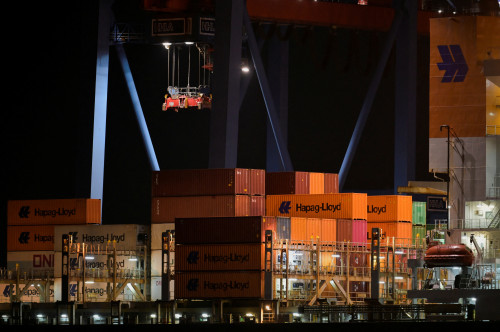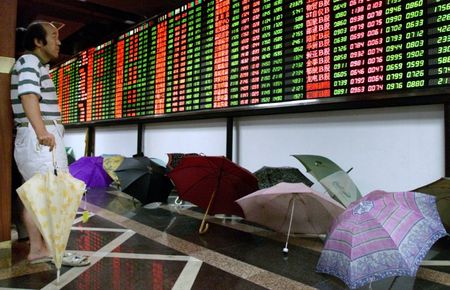LONDON/NEW YORK (Reuters) -U.S. President Donald Trump cranked up his trade threats on Friday, targeting both smartphone giant Apple along with imports from the entire European Union, roiling global markets.
Trump threatened to impose a 25% tariff on Apple for any iPhones sold, but not manufactured, in the United States. He also said he would recommend a 50% tariff on the European Union to begin on June 1.
Stock indexes in the U.S. and across Europe fell, although they pared earlier sharper losses. The U.S. benchmark S&P 500 was down about 0.8% and the pan-European STOXX 600 index was last down 1.1%.
COMMENTS:
JIM CARROLL, PORTFOLIO MANAGER, BALLAST ROCK PRIVATE WEALTH, CHARLESTON, SOUTH CAROLINA
“The response to today’s news about EU tariffs and Apple is a combination of that specifically, and continuing unease about interest rates, aggravated by the feeling of ‘we’re heading into a long weekend here, Mr. President’ and we could do without another bombshell. We need to remember who drives the market – the marginal buyer or seller. And if I’m on the fence and then I read this news, I’m probably not going to be buying and I’m even possibly going to consider taking more risk off the table. I think we could get some investor fatigue in here and wind up with a dip that no one wants to buy. Investors need to make sure they are not stuck in the middle, with a three- to six-month time horizon, in this kind of environment. That’s too long a time period to profit from short-term trading opportunities created by volatility, and too short to reflect a patient long-term approach to investing.”
MARK MALEK, CHIEF INVESTMENT OFFICER, SIEBERT FINANCIAL, NEW YORK
“Just when the market looked as if it had finally recovered from all the turmoil surrounding the deficit debate, this fresh round of tariffs news arrives. It’s serving as a reminder that while it’s been overshadowed by the fiscal legislation, there’s this whole other big thing going on, and it may not be going so well at least with the EU. The news itself shouldn’t have come as much of a shock as the EU had been making noises earlier this week that it wouldn’t necessarily just bend the knee. Equally, there had been a lot of rumors in the wind on Wall Street that Apple would find a way to escape tariffs, and this obviously didn’t escape the president’s gaze. The market is still fine-tuning its response right now, though. Initially, the futures implied something way worse and now we’ve recovered a bit of ground. But it’s all a reminder that this issue is not going away any time soon, almost certainly not this summer. I think we’ll still be seeing it affect markets well into the fourth quarter.”
SAM STOVALL, CHIEF INVESTMENT STRATEGIST, CFRA RESEARCH, PENNSYLVANIA
“The renewed tariff war with Europe is going to affect the U.S. as well as Europe. It’s going to be causing investors to move into money market funds, just to hide out in the safety of cash because if bonds are going to be hit by rising interest rates, if earnings are going to be hit by higher rates and tariffs… then in many ways there’s no place to hide.”
“I would conclude that no company is safe after Trump has singled out Apple. Every company could be subject to higher tariffs and that it would be very difficult to select individual companies that could end up outperforming.”
JAKE MILLER, CO-FOUNDER & CHIEF SOLUTIONS OFFICER, OPTO INVESTMENTS, LOS ANGELES, CALIFORNIA
“Renewed and targeted tariff threats on Apple and the EU show that despite some recent ‘wins’ we may be in the early innings of trade war risk in portfolios, and those risks might be more localized that investors anticipate and portfolios are ready for.
“Should investors believe these risks are compensated or diversifying — probably not, so it’s an implicit bet you’re taking, not a choice you’re making. We continue to look for sectors and assets that can insulate our funds and investors and provide safe harbor in whichever direction trade goes from here. Lower middle market PE opportunities earlier in the supply chain and in critical support industries like logistics continue to look interesting as the state of play develops.”
ROBERT SOCKIN, SENIOR GLOBAL ECONOMIST, CITIGROUP, NEW YORK
“I really think that this 50% tariff is a negotiating threat by Trump to bring Europeans to the table. Europe has the second largest trade surplus with the U.S. after China, such a level of tariff would be relevant for pharmaceuticals, autos. I imagine this would be quite disruptive. At the previous tariff levels, we were predicting a 1 percentage point reduction in Europe’s GDP growth. With a 50% tariff, there would be a recessionary forecast for Europe, but I am doubtful it would be enacted. The threat of tariffs on Apple also seems to be a threat to get more commitments of investment in the U.S.”
NATHAN SHEETS, GLOBAL CHIEF ECONOMIST, CITIGROUP, NEW YORK
“It feels the 50% tariff is about negotiation, and Trump has been redefining the terms of the alliance with Europe, making it more transactional. My base case is that they are able to reach an agreement but I am most nervous about negotiations with European Union.”
“On the threat of tariffs on Apple, it may create an additional political challenge to the Trump administration once they are enacted. As consumers see prices going up, they’ll be upset and concerned about it. We’re still recovering from the COVID-era inflation, and in many ways Trump was elected because voters were worried about inflation issues. The public response to that could be quite loud. Sales of iPhones in the U.S. are very high, across the income distribution. Many people see a smartphone as a necessity, and higher tariffs on electronics could have a political effect.”
ON EU TARIFFS:
KALLUM PICKERING, CHIEF ECONOMIST, PEEL HUNT, LONDON
“The market is giving the signal that this policy move by the U.S. – judging by what we see in currencies – is probably amplifying problems that the U.S. economy has.
To a certain extent, we’ve seen this before. Donald Trump, when he’s not getting what he wants in negotiations, tends to escalate. The EU is a big economic entity with influence in trade negotiations and probably thinks it can stand its ground with America and will be prepared to tolerate some pain, as opposed to giving into requests from Trump that EU officials think are unreasonable.”
HOLGER SCHMIEDING, CHIEF ECONOMIST, BERENBERG, LONDON
“This is a major escalation of trade tensions. With Trump you never know but this would be a major escalation. The EU would have to react and it is something that would really hurt the US and European economy. But Trump is highly volatile and I would not bet on this coming through.”
GERRY FOWLER, HEAD OF EUROPEAN EQUITY STRATEGY, UBS, LONDON
“The 10% tariff that Europe is currently experiencing was always going to be a best case scenario considering that’s what the UK was able to achieve anyway. So tariffs were likely to go up, they could obviously in the worst case scenario not only be 20% but potentially higher, but also cause retaliation against some of the Mag 7.
So this is much worse but it is also a bit like the China tariffs -probably not a sustainable tariff.
“Even the fact that he’s used the phrase “I recommend” suggests this is part of the late stage negotiation tactics. But if they’re even close to being implemented, then obviously Europe’s retaliation would be very significant so quite problematic.”
FIONA CINCOTTA, SENIOR MARKET ANALYST, CITY INDEX, LONDON
“The market was in this sense of perhaps there are going to be trade deals and worst case scenario is potentially being avoided after Liberation day and then there was that pause. But this latest threat is worse than the worst case scenario.”
“We’re seeing a big impact in equities in Germany particularly, because they’re very much an export nation to the US, which will be impacted and so those companies are going to see profits hit, they’re going to see revenue and margins hit. So we’re seeing the this play out much more in the equities market than others.”
JOHN CANAVAN, LEAD ANALYST, OXFORD ECONOMICS
“Treasury yields are lower ahead of the open this morning in response to a safe-haven bid over the past few minutes on additional tariff threats from President Trump. U.S. equity index futures spent most of the night narrowly mixed, but have declined on the latest development. The dollar index has been falling steadily throughout the night, with additional losses after the latest tariff threats.”
ON APPLE TARIFFS:
MATTHEW TUTTLE, CHIEF EXECUTIVE OFFICER, TUTTLE CAPITAL MANAGEMENT, RIVERSIDE, CONNECTICUT
“The flip-side of Trump’s inner circle are the stocks that Trump has issues with. That will impact Apple, at least today. It should also impact any other tech names making products overseas.”
DANIEL IVES, ANALYST, WEDBUSH SECURITIES, NEW YORK
“This would result in an iPhone price point that is a non-starter for Cupertino and translate into iPhone prices of ~$3,500 if it was made in the U.S. which is not realistic as this would take 5-10 years to shift production to the U.S. We believe the concept of Apple producing iPhones in the US is a fairy tale that is not feasible.”
(Reporting by the Markets team; Editing by Amanda Cooper, Dhara Ranasinghe and Lewis Krauskopf)




